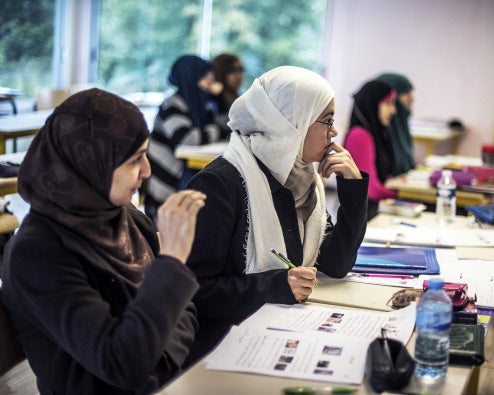It's wrong to blame Madrassas for extremism – I went to one and it didn't make me an intolerant Muslim
The curricula is classical Arabic, daily supplications and basic etiquettes of Islam, not extremism

Your support helps us to tell the story
From reproductive rights to climate change to Big Tech, The Independent is on the ground when the story is developing. Whether it's investigating the financials of Elon Musk's pro-Trump PAC or producing our latest documentary, 'The A Word', which shines a light on the American women fighting for reproductive rights, we know how important it is to parse out the facts from the messaging.
At such a critical moment in US history, we need reporters on the ground. Your donation allows us to keep sending journalists to speak to both sides of the story.
The Independent is trusted by Americans across the entire political spectrum. And unlike many other quality news outlets, we choose not to lock Americans out of our reporting and analysis with paywalls. We believe quality journalism should be available to everyone, paid for by those who can afford it.
Your support makes all the difference.David Cameron's speech last week compelled me to reminisce on my childhood years at the local Madrassa. Was I told to be an isolationist and not mix with people of other faiths? Was I brainwashed against the people of the Jewish faith? Absolutely not. Like many of the children who attend Madrassa today, my Madrassa education was primarily focused on learning classical Arabic, the language of the Qur'an.
Since 9/11 and 7/7 supplementary schools, also known as Madrassas have been under scrutiny for breeding intolerance and a form of extremist Islam. This suspicion is now even more pronounced as the PM said that in Madrassas: '...we've got children being taught that they shouldn't mix with people of other religions; being beaten; swallowing conspiracy theories about Jewish people.“
In light of this, the government is suggesting that supplementary schools need to be registered and will also be subject to an inspection.
This new inspection regime would apply to religious institutions offering eight or more hours of study a week and could include Christian Sunday schools and Jewish Yeshivas, but is unlikely to affect them as they teach fewer hours.
The PM said that there was nothing wrong with children learning about their faith, whether it's at Madrassas, Sunday schools or Jewish Yeshivas, but in order to prevent radicalisation, minds must be broadened and not 'filled with poison.'
While he is absolutely right, it is also vital to understand that, firstly, there is no robust evidence to substantiate claims that Madrassas are preaching intolerance or extremism. Secondly, there is also no evidence linking Madrassas to the radicalisation of young Muslims in Britain. These fears are not sourced on rigorous research but spring from intermittent reporting and speculation in the media.
Muslim leaders feel that this rhetoric is peddling anti-Muslim sentiments in a climate when Muslims are already feeling alienated and marginalised.
The curricula is classical Arabic, daily supplications and basic etiquettes of Islam. There is also a strong tradition among Muslims to memorise the Qur'an, thus some young Muslims will spend around eight hours a week memorising.
As a Muslim who attended Madrassa and now has family and friends whose children attend Madrassas for approximately eight hours a week, I can say that Madrassas are not religious silos breeding intolerance.
Madrassas are an important feature of the Muslim community, they can be, and have been pivotal in engendering mutual respect, tolerance and integration. Most Madrassas focus on nurturing the identity of the children as young British Muslims; though in some cases things could be better. There are some Madrassas on the fringes which allow corporal punishment, and certainly have pedagogical issues which needs to be addressed.
In order to combat radicalisation, we need a choreographed strategy; Madrassas and mosques are an important feature of the Muslim community and can reinforce community cohesion and integration.
Muslims fundamentally want to counter the 'poisonous narrative' of radicalisation, so why not collaborate with them?
The government should adopt a policy of engagement with Muslim leaders and the wider Muslim community.
Research and recent surveys show that Muslims are being unfairly demonised, and made to feel alienated in a West that often mocks and ridicules their religion and identity as a Muslim. For example, according to the Charity ChildLine, Islamophobic bullying is now rife in schools.
Let's not forget we have an entire generation of young Muslims who are born into a turbulent era, and their identity is taking shape in a climate where they fear being suspected as 'potential terrorists' or 'disloyal others'.
This is a catastrophic for two reasons. First, it can cause alienation among the Muslim community; and as a result of this alienation, we have the potential breakdown of a flourishing multicultural society. Academic research has illustrated that one of the factors underpinning radicalisation is sense of belonging and identity.
Extremists want Muslims living in the West to feel rejected and marginalised. By tarring all British Muslims with the same brush we are inadvertently following their script to the letter.
Join our commenting forum
Join thought-provoking conversations, follow other Independent readers and see their replies
Comments